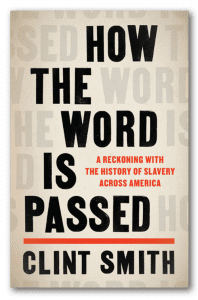In the interdisciplinary, team-taught course I am participating in this semester, we spent our second week on issues related to slavery. One of our central texts was Clint Smith’s How the Word Is Passed, whose subtitle is “A Reckoning with the History of Slavery Across America.” 
How the Word is Passed is both stunning and disturbing. The flyleaf describes the book as “an unforgettable tour of monuments and landmarks—those that are honest about the past and those that are not—that offer an intergenerational story of how slavery has been central in shaping our nation’s collective history and memory.” A central chapter is centered on Blandford Cemetery in Petersburg, Virginia, where 30,000 Confederate soldiers are buried in a mass grave—the names of only about ten percent of these soldiers are known.
Each Memorial Day at Blandford Cemetery, the Sons of Confederate Veterans host an event to honor the Confederate dead and, in many ways, to tell a story of the Civil War that focuses on the “Lost Cause,” a perspective that Smith describes as “a movement that gained traction in the late nineteenth century that attempted to recast the Confederacy as something predicated on family, honor, and heritage rather than what it was, a traitorous effort to extend and expand the bondage of Black people.” Smith, the only person of color in sight at the rally, stood at the back and listened as the keynote speaker began his speech. “I came across a story the other day,” the speaker said. “I don’t know if it’s true or not, but I like it.” The story he told was one entirely in line with the Lost Cause narrative.
“I don’t know if it’s true or not, but I like it.” This reminds me of something an English professor who was one of my mentors in my early years of teaching was fond of saying about various myths and stories from the past: “If this story isn’t true, it should be.” He, at least partially, intended this as a laugh line, but it raises an important question: How much of what we believe to be true is simply a projection of what we want to be true?
I am also teaching my favorite introductory philosophy course, General Ethics, this semester. I chose a few years ago to make this course as contemporary as possible—with two exceptions, every assigned text was written within the past ten years. One of the exceptions comes tomorrow from of my three or four favorite writers—16th century French philosopher and essayist Michel de Montaigne. We will be working on perhaps Montaigne’s most famous essay—“On Cannibals.”
Reflecting on the visit to France of several Brazilians from cannibal tribes in the New World, Montaigne notes that just as cultured Europeans of his day were appalled by various Brazilian tribal practices, so the visitors were also confused and appalled by certain European cultural norms. Stepping back, Montaigne argues first that a stronger case for barbarism could be leveled against Europeans than against the cannibals. Then he puts his finger on an issue that is remarkably relevant to our contemporary world.
We all call barbarous anything that is contrary to our own habits. Indeed, we seem to have no other criterion of truth and reason than the type and kind of opinions and customs current in the land where we live. There we always see the perfect religion, the perfect political system, the perfect and most accomplished way of doing everything.
Our own myopias and parochialisms are usually defined by something other than national borders, but Montaigne’s point is clearly as true now as it was in his day. We tend to believe that what we are most accustomed and used to is true, without ever wondering how we came to be accustomed and used to these things in the first place. We resonate most strongly with those who mirror back to us what we are already thinking.
Parochialism and attachment to what we think we know is not a problem exclusive to any particular set of beliefs or experiences. All of us, from conservative to progressive, from atheist to dedicated religious believer, assume that the way that we think is not only the epitome of common sense, but also the standard of reason well used. Yet as Adam Etinson, a contemporary commenter on Montaigne’s “On Cannibals” observes,
Moral reasoning is generally something we use merely to convince others of long-held beliefs that we are unwilling to abandon . . . often, no amount of persuasive reasoning, clear argument or exposed contradiction can shake us from what we already believe.
Why are we so inclined to hang on to our most entrenched thoughts, even in the face of evidence that our most deeply held beliefs are rooted in anything but experiential evidence supported by logical reasoning?
Useful Delusions: The Power and Paradox of the Self-Deceiving Brain by Shankar Vedantam, is a fascinating exploration of this and related questions. Vedantam is the creator and host of “Hidden Brain,” one of my favorite podcasts. In a wide-ranging discussion, Vedantam uses neuroscience, psychology, sociology, history, and various other intersecting disciplines to sketch a picture of just how difficult the problem we face when it comes to finding the truth actually is.
We are not just in a war with con artists, conspiracy theorists and demagogues. We are in a war with ourselves. Our minds are not designed to see the truth, but to show us selective slices of reality, and to prompt us toward predetermined goals. Even worse, they are designed to do all this while giving us the illusion that we are seeing reality. We can believe that we are thinking clearly, acting rationally, and fighting for the truth, even as we are beguiled into seeing what is functional for our groups, our families and ourselves—and imagining it to be the truth.
In various ways, human “knowers” are an eclectic hodgepodge of various evolutionary and creative features that, when it comes to the search for truth, do not play well together. As renowned biologist E. O. Wilson once put it, “We have paleolithic emotions, medieval institutions, and God-like technology.”
The next time you are inclined to criticize and drop negative social media bombs on a person who not only believes differently than you do, but also appears to do so with cavalier and stubborn resistance to the evidence and facts that are so clear to you, step back for a moment. You are undoubtedly doing the same thing. There is no human being who has access to an objective, God-like perspective on anything. We are all in this frustrating and interesting cognitive mess together.
In one of the first week classes in General Ethis, I asked my students the following: “How many of you think that you would be a very different person today if you had been born in rural Tibet instead of where you were actually born?” All hands go up. “Why?” Because, as everyone knows, we are shaped early and often by features of our existence—our society, family, location, social status—that we do not choose.
Yet we often wander unreflectively through life relying on these foundations that we did not choose, as if we had magically been given the universal truth about all important issues at birth. The fact that our deepest held beliefs would be different had we been born elsewhere on the planet (or even to different parents farther down the street) should disconcert us. In every course syllabus I include Spinoza’s observation that “I do not know how to teach philosophy without disturbing the peace.” The “What if you were born elsewhere?” exercise is one of the more effective peace disturbers in my teaching arsenal.
Returning briefly to How the Word Is Passed, one of the best one-line strategies I’ve heard in a long time for how to regularly combat our natural willingness to believe as true what is simply convenient and comfortable comes from a young woman who was the guide for a tour that Clint Smith and others took of various slavery-themed sites in Manhattan. The young woman’s advice for how to grapple with what might or might not be true? Don’t believe anything to be true that makes you comfortable. As I often tell my students, in the world of truth, comfort is vastly overrated.
Of all the things I deeply believe, those that I have embraced through the process of challenging preconceptions and previously unchallenged assumptions are the ones that are now most definitive of who I am. All of us should regularly reexamine our beliefs and practices, become alert to weaknesses and inconsistencies in our own thinking, discover something plausible in another’s point of view and in so doing, become better than the parochial and myopic creatures that we naturally are. After all, none of us needs to believe everything that we think.













